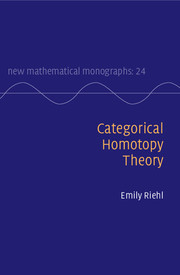Book contents
- Frontmatter
- Dedication
- Contents
- Preface
- PART I DERIVED FUNCTORS AND HOMOTOPY (CO)LIMITS
- PART II ENRICHED HOMOTOPY THEORY
- PART III MODEL CATEGORIES AND WEAK FACTORIZATION SYSTEMS
- 11 Weak factorization systems in model categories
- 12 Algebraic perspectives on the small object argument
- 13 Enriched factorizations and enriched lifting properties
- 14 A brief tour of Reedy category theory
- PART IV QUASI-CATEGORIES
- Bibliography
- Glossary of Notation
- Index
13 - Enriched factorizations and enriched lifting properties
from PART III - MODEL CATEGORIES AND WEAK FACTORIZATION SYSTEMS
Published online by Cambridge University Press: 05 June 2014
- Frontmatter
- Dedication
- Contents
- Preface
- PART I DERIVED FUNCTORS AND HOMOTOPY (CO)LIMITS
- PART II ENRICHED HOMOTOPY THEORY
- PART III MODEL CATEGORIES AND WEAK FACTORIZATION SYSTEMS
- 11 Weak factorization systems in model categories
- 12 Algebraic perspectives on the small object argument
- 13 Enriched factorizations and enriched lifting properties
- 14 A brief tour of Reedy category theory
- PART IV QUASI-CATEGORIES
- Bibliography
- Glossary of Notation
- Index
Summary
Often the context in which one runs the small object argument is an enriched category. These enrichments need not necessarily be topological in flavor – for instance, Ch.(R) is enriched over ModR, provided the ring R is commutative – though we see later that the case of a simplicial model category is particularly well behaved. As defined in the previous chapter, Quillen's and Garner's small object arguments fail to produce enriched functors, but only because the initial step, which forms the coproduct of generating arrows indexed over the sets of commutative squares from each generator to the map to be factored, is not enriched, as illustrated by Example 3.7.17.
In this chapter, we prove that a modified version of either Garner's or Quillen's construction does produce an enriched functorial factorization. We call this the enriched small object argument. By design, the right factor produced by the enriched small object argument is a member of the right class of the original cofibrantly generated weak factorization system. If a certain condition is satisfied, then the left factor is a member of the left class. In this case, the unenriched factorizations of the cofibrantly generated weak factorization system can be replaced by enriched factorizations whenever it is convenient.
Perhaps more interesting is the case when the condition needed to guarantee compatibility of the left factor produced by the enriched small object argument fails.
- Type
- Chapter
- Information
- Categorical Homotopy Theory , pp. 222 - 239Publisher: Cambridge University PressPrint publication year: 2014



